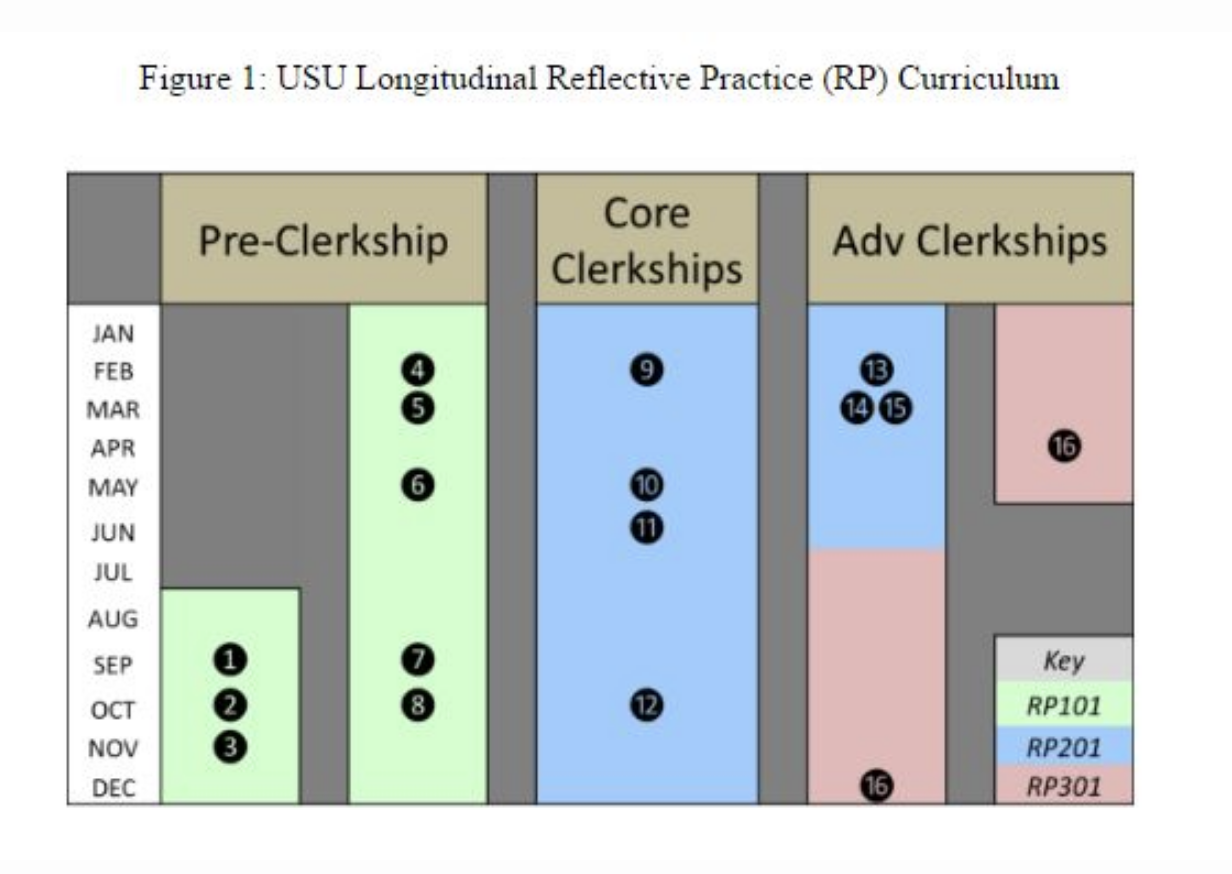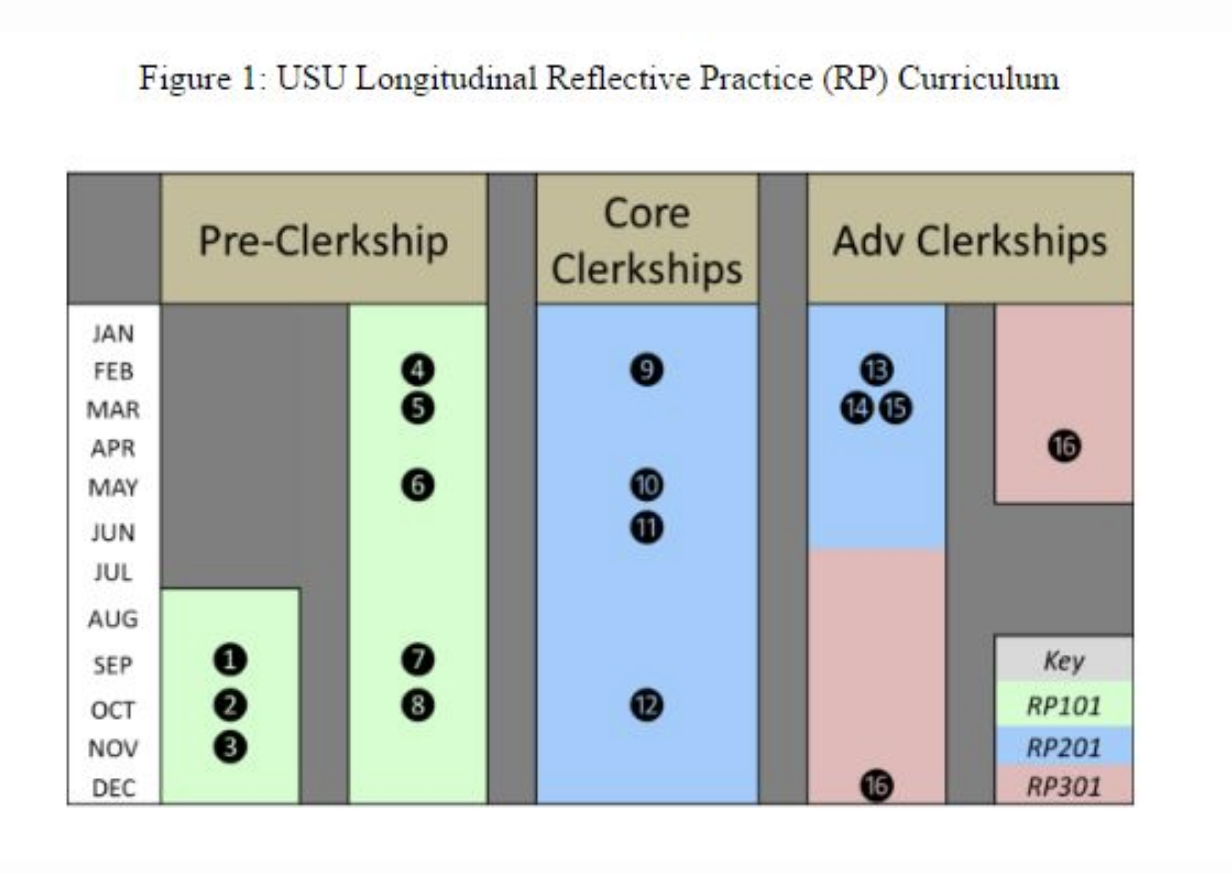Reflective Practice Curricula: Implementation and Facilitation
Adam K. Saperstein, MD; Karlen S. Bader, BS, Uniformed Services University of the Health Sciences, F. Edward Hebert School of Medicine
It is becoming increasingly well accepted that developing the ability to reflect on one’s experiences is an essential attribute of competent health care providers.1-4 This is due in large part to the fact that reflection (perhaps best described as “the expertise-enhancing, metacognitive, tacit process whereby personal experience informs practice”)4 has been demonstrated to develop critical thinking skills, promote clinical reasoning, foster professionalism, improve patient-provider communication, reduce diagnostic error, and enhance the practical wisdom needed to guide clinical practice.1,3-6 Although reflective practice is not always intuitive, especially for trainees early in their medical careers, it is a skill that can be cultivated through development and implementation of a reflective practice curriculum. Such curricula are most likely to be effective when implemented early and continued throughout the course of a health professional’s training, using strategies that meet learners’ needs.2,4
There are many expressive media that facilitate learners’ development of reflective capacity. These include: reflective and creative writing, poetry, visual art, performance art, medical improvisation, portfolios, listservs, social media, facilitated small-group discussions, and video essays, among others.3,7,8 While easier to implement, curricula that incorporate a single medium will likely meet the needs of only a portion of one’s learners. In response, some schools require participation in reflective practice but allow students the freedom to select the medium through which they develop their reflective capacity.9 Another approach has been to have a core reflective practice curriculum using one medium, with opportunities to participate in electives using other media as a curricular supplement.
Barriers to implementing a reflective practice curriculum early in a student’s career include: difficulty identifying available time for such a curriculum; being able to recruit, coordinate, and offer the requisite faculty development for a large cadre of facilitators; and students’ lack of clinical experience on which to reflect. One strategy to overcome this last barrier is the use of panels and/or high-quality written, audio, and video content as stimuli for reflection. Offering learners these stimuli allows them to consider the experiences of others, examine their reactions to such experiences, identify the sources of those reactions, explore the implications of those reactions, and develop a plan for future patient care experiences while engaging with a medium (audio, video, written, etc) with which they best relate. In the context of curriculum reform at our institution, the Uniformed Services University, we sought an online platform that served as a searchable repository of such stimuli, offered educators the ability to share reflective practice curricula, and which was intuitive to use and readily accessible for learners. Given the absence of such a platform, in Spring 2015, we created www.reflectivepractice.net.
Our goal in creating this website is to leverage the ability of a diverse community of educators and learners to best identify and share high-quality reflective practice stimuli and to create and share reflective practice curricula. In addition, the site offers faculty development tips for those teaching reflective practice. Health care educators may apply for a free faculty account from the homepage. Once approved, faculty account holders can contribute resources, review others’ curricula, copy and then edit copies of others’ shared curricula with automated attribution for the original author, and create original curricula. The aforementioned resources can be easily embedded into any lesson, and lessons are automatically collated into an individualized link, created for each program on the site.


Creation of this platform has facilitated implementation of our longitudinal, 4-year Reflective Practice curricula (Figure 1) as well as implementation of Reflective Practice curricula for resident learners designed to improve reflective capacity and help residencies meet ACGME milestones in Communications and Professionalism. For additional information, please check out the website, or contact Adam Saperstein, MD (adam.saperstein@usuhs.edu) or Ms Karlen Bader (karlen.bader.ctr@usuhs.edu).
Disclaimer: The views expressed in this manuscript are solely those of the author and do not necessarily reflect the opinion or position of the Uniformed Services University of the Health Sciences, the US Navy, or the US Department of Defense.
References
- Aronson L. Twelve tips for teaching reflection at all levels of medical education. Med Teach 2011;33(3):200-5.
- Kanthan R, Senger JL. An appraisal of students' awareness of "self-reflection" in a first-year pathology course of undergraduate medical/dental education. BMC Med Educ 2011;11:67.
- Mann K, Gordon J, MacLeod A. Reflection and reflective practice in health professions education: a systematic review. Adv Health Sci Educ: Theory Pract 2009;14(4):595-621.
- Wald HS, Borkan JM, Taylor JS, Anthony D, Reis SP. Fostering and evaluating reflective capacity in medical education: developing the REFLECT rubric for assessing reflective writing. Acad Med 2012;87(1):41-50.
- Walling A, Shapiro J, Ast T. What makes a good reflective paper? Fam Med 2013;45(1):7-12.
- Stephens MB, Reamy BV, Anderson D, et al. Writing, self-reflection, and medical school performance: the Human Context of Health Care. Mil Med 2012;177(9 Suppl):26-30.
- Veno M, Silk H, Savageau JA, Sullivan KM. Evaluating one strategy for including reflection in medical education and practice. Fam Med 2016;48(4):300-4.
- Green MJ. Comics and medicine: peering into the process of professional identity formation. Acad Med 2015;90(6):774-9.
- Hall P, Byszewski A, Sutherland S, Stodel EJ. Developing a sustainable electronic (ePortfolio) program that fosters reflective practice and incorporates CanMEDS competencies into the undergraduate medical curriculum. Acad Med 2012;87(6):744-51.
